WordPress Hosting vs WooCommerce Hosting Explained – Everything You Need to Know
- By
- Last updated:
- Leave your thoughts
If you have a WooCommerce store, hosting is going to play a pivotal role in its success.
At a basic level, your hosting will affect how quickly your store loads and whether your site experiences any downtime or slowdowns (which are killers for eCommerce stores). But, beyond that, hosting that’s optimized for WooCommerce can also give you features, tools and benefits that help to make your life easier and help you to build a better store, especially if you’re just getting started with WooCommerce.
But here’s the thing — not all WordPress hosting is optimized for WooCommerce. When you’re choosing hosting for your WooCommerce store, there are some important differences to consider between going with any old WordPress host and going with a WooCommerce host.
In this post, I’m going to dig into the differences between generic WordPress hosting vs optimized WooCommerce hosting, so you know why some hosts are better than others for hosting WooCommerce stores.
To do this, I’ll touch on some of the unique considerations you need to have when hosting WooCommerce stores, as well as some real examples of how certain hosts have built these optimizations into their offerings.
By the end, you should have a better idea of the features to look for when hosting a WooCommerce store, as well as why your average WordPress host (or even a good WordPress host) may not be the best place for a serious WooCommerce store.
Table of Contents
- What Is WooCommerce Hosting? A Quick Explainer
- WooCommerce Hosts Optimize for WooCommerce’s Unique Performance Needs
- WooCommerce Hosting Puts More Emphasis on Reliability and Support
- Good WooCommerce Hosting Is More Expensive Than Regular Hosting (And You Should Pay)
- Some WooCommerce Hosts Offer Optimized Features/Workflows
- Some Hosts Offer Free WooCommerce Plugins and Tools to Save Money
- Some Suggestions for the Best WooCommerce Hosting
- Final Thoughts
Let’s dive in!
What Is WooCommerce Hosting? A Quick Explainer
Before we get into the details, I first just want to start with a little explainer to set the stage, because some people may be confused that I’m making a distinction between WordPress hosting vs WooCommerce hosting.
This can be a bit confusing because, at a basic level, virtually all WordPress hosting is capable of running WooCommerce. That is, if you can install WordPress on a host, you’ll also be able to install WooCommerce, because WooCommerce is just a plugin for WordPress.
For that reason, the distinction between WordPress and WooCommerce hosting isn’t anything to do with the basic server requirements. Instead, it’s more to do with the features, performance optimizations, and benefits you get on top of those basic WordPress hosting features.
With that in mind, we could define WooCommerce hosting as something like this:
WooCommerce hosting is WordPress hosting with added performance optimizations, features, and benefits that are specifically targeted to WooCommerce users.
So, in this comparison, I’ll really be highlighting how some WordPress hosts can go above and beyond for WooCommerce stores, either with features built into their core WordPress offerings or with dedicated WooCommerce hosting plans.
Real WooCommerce Hosting vs Rebranded WordPress Hosting
Another tricky consideration here is that some WordPress hosts will just create a dedicated landing page for WooCommerce store owners, even though the hosting they offer is the exact same as their regular hosting.
For example, A2 Hosting advertise both WordPress hosting and WooCommerce hosting, but, while these have separate landing pages, they’re really the exact same plan. Unfortunately, you really can’t run a WooCommerce store on $2.99-a-month shared hosting:
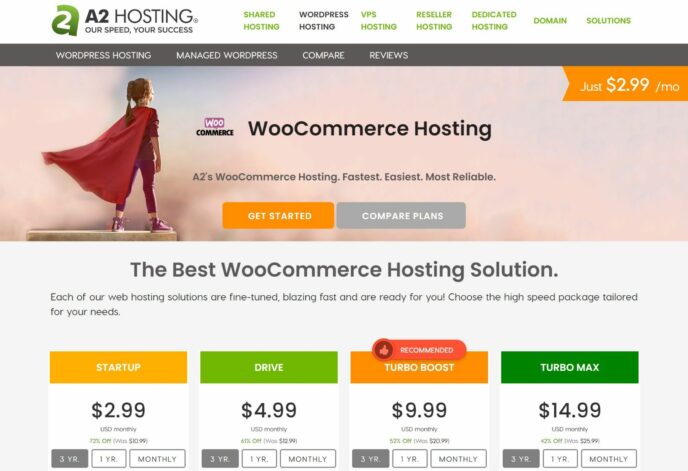
On the other hand, Liquid Web offer both managed WordPress hosting and managed WooCommerce hosting via their Nexcess subsidiary. However, these plans are unique, with different pricing, features, optimizations, and so on.
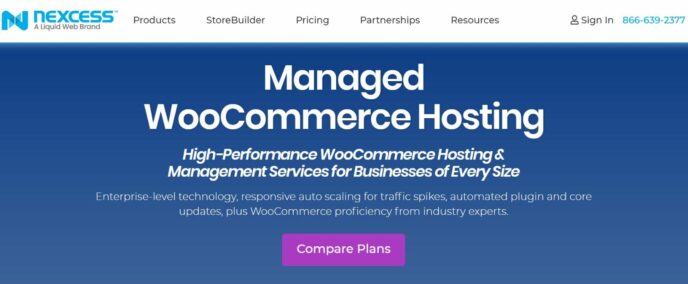
Similarly, WP Engine also just released their own set of dedicated WooCommerce hosting plans, which are slightly more expensive than their regular plans and include some eCommerce-specific features:
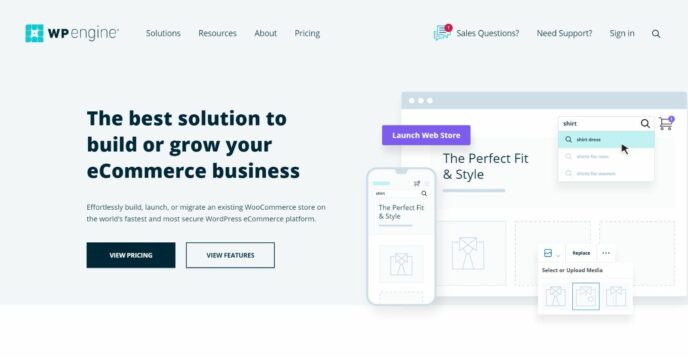
Having a single WordPress plan for regular sites and WooCommerce stores isn’t always a bad thing, though. For example, Kinsta and Pagely are very good WooCommerce hosts, even though they don’t offer special WooCommerce hosting plans (though they do have useful add-ons and expertise for WooCommerce stores).
The key idea here is that you shouldn’t automatically assume a hosting product is good for WooCommerce just because the company advertises a separate ‘WooCommerce hosting’ product in addition to their regular plans. You need to really dig in and see what features and optimizations they have for WooCommerce stores.
So, with that in mind, let’s talk about some of the things that make WooCommerce hosting unique as compared to generic hosting for WordPress sites.
WooCommerce Hosts Optimize for WooCommerce’s Unique Performance Needs
One of the biggest differences between WooCommerce hosting and WordPress hosting has to do with performance. WooCommerce stores have unique performance needs and requirements, which means you shouldn’t automatically assume that run-of-the-mill WordPress hosting can handle WooCommerce stores.
There are two big areas here where you’ll see differences between regular WordPress hosts and WooCommerce hosts:
- Caching
- Database calls/optimizations
WooCommerce-Optimized Caching
Caching is a great strategy to improve your WordPress site’s performance and scalability. It speeds up your site and reduces the load on your server by caching static HTML versions of your pages. This eliminates the need for your server to process PHP and query the database for each visit.
For this reason, many WordPress hosts have now started offering built-in caching solutions. This has long been the case with managed WordPress hosting, but you’re now also finding it on a lot of budget WordPress hosts, too, such as DreamHost and Bluehost.
Unfortunately, though, you can’t just apply blanket caching to WooCommerce like you can to a lot of other WordPress sites. If you do, you’ll break key functionality, such as your store’s shopping cart icon and other dynamic behavior.
A good WooCommerce host needs to understand these differences and have built-in optimizations to their caching solution that can handle WooCommerce stores.
For example, if WP Engine detect that you’re using WooCommerce, they’ll automatically exclude key pages and cookies to ensure you can still benefit from WP Engine’s caching as much as possible, while also avoiding breaking things on your store.
Or, for another example, Liquid Web built their own unique performance platform for WooCommerce stores on their managed WooCommerce hosting, taking into account the unique caching issues for WooCommerce.
Solutions for Heavy Database Usage
Most of your WooCommerce store’s content is stored in its database. Your site’s files control how your store looks and include your product images, but all of your actual product details (descriptions, prices, stock status, etc.), order data, customer information and so on are all stored in your site’s database.
Overall, WooCommerce stores are a lot more database-intensive than your average WordPress site, which puts a lot more stress on your hosting.
One reason has to do with caching, as I explained above. Because you can’t rely on caching for a lot of your store’s pages, WordPress will need to query your database on many page loads, which means more database queries from the get-go.
However, even without the caching issue, WooCommerce stores are still going to hit your database a lot harder. For example, think of how many products and product details your store needs to load on the shop and category archive pages. The same holds true for shoppers’ ‘My Account’ pages, which need to load a shopper’s order history, account details, and more.
All of those details require queries to your site’s database, and, most importantly, can’t be papered over by using page caching.
Beyond that, WooCommerce stores are heavily reliant on search, as most of your store’s shoppers will use product search to find what they’re looking for. Each search request requires heavy database queries, which adds even more weight.
A regular WordPress host, especially one on the budget end, is going to crack under all of these database queries and you’ll end up with incredibly slow load times or maybe even reliability issues.
WooCommerce hosting will be prepared for these bottlenecks, and powerful enough to still keep working. Many WooCommerce hosts will also build in features and add-ons to lessen the load on your site’s database.
For example, most WooCommerce hosts now offer Elasticsearch to power your store’s product search, which takes the load off your WordPress site’s database by relying on an Elasticsearch-powered search index.
You can see this with some of the standout WooCommerce hosts — WP Engine offer Elasticsearch on most of their eCommerce plans, Kinsta offer an Elasticsearch add-on on their plans and Liquid Web offer Elasticsearch on the higher-end of their managed WooCommerce hosting.
Another thing some WooCommerce hosts do to cope with the database-intensive nature of WooCommerce stores is to create their own set of database tables to improve database performance. For example, part of Liquid Web’s special WooCommerce optimizations includes a custom database table setup, which they claim can reduce query loads by 95% and improve capacity by more than 75% without upgrading plans. You can learn more about the changes at this GitHub page .
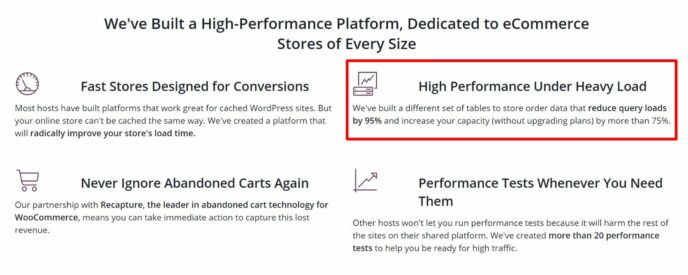
These are all of the types of optimizations you should expect from good WooCommerce hosting, but that you won’t necessarily get with regular WordPress hosting.
WooCommerce Hosting Puts More Emphasis on Reliability and Support
Having reliable hosting is important for all WordPress sites, but the stakes are a lot higher when you’re hosting a WooCommerce store.
If your portfolio site goes down for a couple of hours, you’ll be a little frustrated but there’s probably not going to be a huge effect on your business. If your WooCommerce store goes down for a couple of hours, though, that means lost revenue and a loss of trust with your shoppers.
Basically, while a 99% uptime guarantee may work for most WordPress sites, that’s not even close to enough for a WooCommerce store.
WooCommerce stores need to be looking for a 99.9% guarantee at a bare minimum backed by a Service Level Agreement (SLA) that details exactly what remedies are available to you if the host doesn’t meet that guarantee.
Ideally, you’ll want something even higher. For example, Pagely offer a 99.99% guarantee. The difference between 99.9% and 99.99% may seem small, but that’s potentially ~40 minutes of downtime a month, which can be a big deal for eCommerce stores.
Beyond offering reliability in the first place, fast, quality support is also essential if you’re running an eCommerce store. Again, if your portfolio site goes down, you can afford to wait for 20 minutes to get in touch with someone (even if it’s annoying). If your store goes down, though, you want to be able to get someone right away and get the problem fixed right away.
So, if performance didn’t already cut out shared hosting for WooCommerce stores, this is another reason you should pretty much never put a WooCommerce store on cheap shared hosting. Simply put, even the support at a good shared host is still going to be way worse than the support at a good managed WordPress host.
This is why pretty much all of the good WooCommerce hosts turn out to be managed WordPress hosts — when you’re hosting a mission-critical store, you should look for that premium managed WordPress experience when it comes to support and uptime.
Good WooCommerce Hosting Is More Expensive Than Regular Hosting (And You Should Pay)
Overall, WooCommerce hosting just generally costs more than WordPress hosting. This is what lets you get that extra power to handle all of those database queries, the optimized caching solutions, the 99.9%+ uptime, the awesome support, and so on.
If you have a simple blog or portfolio site, the price of your WordPress hosting is probably at the front of your mind, but when you’re choosing WooCommerce hosting price should take a backseat to quality and performance.
Think about if you were running a physical business. Let’s say you’ve invested tens or hundreds of thousands of dollars into planning, equipment, marketing, inventory, and so on. Now, all you need is the physical location for your store. You wouldn’t just go out and try to find the absolute cheapest location possible, right? Instead, you’d try to find the location that puts your business in the best position for success, even if it’s more expensive than other options.
Well, it’s the same for your WooCommerce store. You shouldn’t invest money in building your store only to try to cut costs for the hosting that powers it. Beyond uptime and reliability, there’s plenty of data connecting slower load times with a drop in conversion rates and loss of revenue, so trying to use bargain-basement hosting can have a materially negative effect on your store.
For a simple WordPress site, the difference between $15 a month and $400 a month hosting is pretty huge; for a WooCommerce store, it’s really not a big deal (or it shouldn’t be a big deal).
Perhaps the simplest way to sum up this difference is like this:
Most people view WordPress hosting as a cost. Costs are something you should always strive to minimize. However, you should view WooCommerce hosting as an investment, and you should always try to seek the best return on investment (ROI), even if that means spending more money. So, if you have to spend $400 a month to get fast performance and rock-solid reliability, that’s an investment you should be willing to make for your store every time.
Some WooCommerce Hosts Offer Optimized Features/Workflows
Over the past few years, it’s become pretty standard for most quality WordPress hosting providers to offer convenient features such as automatic backups and staging sites.
These features are also useful for WooCommerce stores, but WooCommerce stores have some unique needs when it comes to these features, so you may not be able to benefit from the standard implementations most WordPress hosts use.
Some WooCommerce-specific hosts offer ways to optimize these features for WooCommerce, though I’d say these features are more ‘nice to haves’ than ‘must haves’ as you can also use plugin solutions.
Backups
Backups are important for all WordPress sites, but they’re a lot trickier for WooCommerce stores because WooCommerce stores are constantly changing, especially when it comes to your store’s database. Every time someone places an order on your site, that order information gets saved in your database.
If your store is constantly getting new orders, that means the once-daily automatic backups most regular WordPress hosts offer aren’t going to cut it, because you’d essentially lose a full day’s worth of orders if you had to restore from a backup.
To address this, some WooCommerce hosting providers give you the ability to take more frequent backups. For example, Kinsta let you upgrade the backup frequency to hourly vs the daily default.
However, some other WooCommerce hosting providers skip this and recommend you use a backup plugin solution instead (e.g. Nexcess). Some good backup plugins for eCommerce stores are Jetpack Backups (with the real-time backups plan), BlogVault (with the Advanced plan) and WP Time Capsule.
Staging Sites
Staging sites are a useful tool to help you to test changes to your site without affecting your live site. Essentially, a staging site is just a duplicate copy of your site that you can work on. Once you’re happy that everything is working on the staging version of your site, you can ‘push’ the staging version live and overwrite the live version of your site.
Staging sites are a pretty common feature in WordPress hosting nowadays, but WooCommerce stores have unique needs when it comes to staging because the WooCommerce database is always changing as you receive new orders.
So, if you create your staging site on Monday and then push it live on Wednesday, you’d lose all of the orders between Monday and Wednesday because those new orders wouldn’t be in the database of your staging site.
For that reason, a really useful feature many WooCommerce hosting providers offer is the ability to choose between completely overwriting your live site or only pushing the files and/or certain database tables. This lets you avoid overwriting your live database when you push staging live.
Some WooCommerce hosting providers even go further. For example, Liquid Web’s Nexcess plans give you the ability to randomly generate user data for the staging version of your site, so you don’t encounter any issues with email automation when you duplicate your site. This is a feature you won’t find with regular WordPress hosting because it’s not really something that affects most regular WordPress sites.
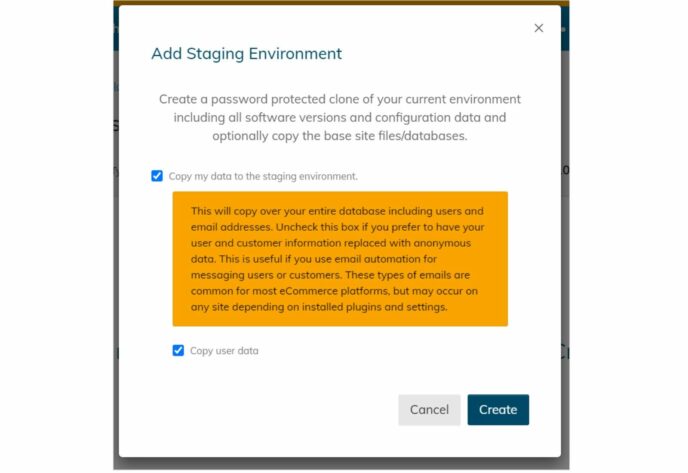
Nexcess also bundle in the WPMerge plugin with their managed WooCommerce plans, which gives you the option to merge your production database with your staging database instead of overwriting it.
Some Hosts Offer Free WooCommerce Plugins and Tools to Save Money
Lastly, some WooCommerce hosts have started offering bundled WooCommerce plugins and tools at no extra cost, which is something you won’t get with a ‘regular’ WordPress hosting plan.
I’d say this last category is the least important distinction between WordPress hosting and WooCommerce hosting because serious stores have the budget to invest in the needed plugins. Additionally, it’s not true across all WooCommerce hosting providers — it’s just a newer trend that we’re starting to see with some dedicated WooCommerce products.
While the WooCommerce plugin itself is free, building a WooCommerce store can still be quite expensive because the cost of additional plugins can quickly add up.
To combat this and create a more site builder-like experience (such as Shopify), some WooCommerce hosts now offer access to official or third-party WooCommerce extensions at no extra cost.
For example, GoDaddy struck a special partnership with WooCommerce for GoDaddy’s dedicated WooCommerce hosting plans. Via this partnership, everyone who hosts their store using GoDaddy’s WooCommerce plans gets access to 40+ official premium WooCommerce extensions at no extra cost — worth around ~$3,000 at retail prices. Plus, you also get access to another 35+ extensions worth another ~$3,000+ thanks to GoDaddy’s late-2020 acquisition of SkyVerge. That puts the number at about 75+ quality WooCommerce plugins worth ~$6,000 at no extra cost. Not bad for hosting that costs $25 a month.

The full list of plugins includes some of the most expensive WooCommerce extensions, such as WooCommerce Subscriptions ($199), WooCommerce Memberships ($199), WooCommerce Bookings ($249), WooCommerce Deposits ($179), and many others. Getting access to all of these official extensions at no extra cost offers incredible value, especially if you’re trying to launch your store on a shoestring budget.
Liquid Web have also done something similar on their managed WooCommerce plans, where they’ve struck deals with a lot of third-party WooCommerce developers to bundle in those products with their hosting.
Depending on which hosting tier you’re on, you can get access to the following plugins, themes and services:
- Astra Pro (the most popular WordPress theme and one that has a great WooCommerce integration).
- Iconic WP plugins.
- Beaver Builder Pro for page building.
- Ultimate Addons for Beaver Builder for 60+ new Beaver Builder modules.
- Glew.io for eCommerce analytics.
- Dokan Pro to create a multi-vendor marketplace.
If you’re a beginner or someone trying to keep your budget down for a side hustle, these types of ‘all-in-one WooCommerce hosting’ offerings can offer a ton of value vs traditional WordPress hosting.
Some Suggestions for the Best WooCommerce Hosting
At this point, we’ve discussed five key areas where WooCommerce hosting is different from regular WordPress hosting.
With everything above in mind, here are a few quality options for WooCommerce hosting. This is just a quick summary to give you some ideas — for more in-depth thoughts, I encourage you to read our full collection of the best WooCommerce hosting:
- Liquid Web and Nexcess — one of the first hosts to offer a truly managed WooCommerce hosting solution that’s 100% tailored to WooCommerce. These plans have some really thoughtful features, such as the ability to add dummy user data when creating a staging site and a custom table for WooCommerce order data.
- WP Engine — recently launched dedicated WooCommerce plans that include Elasticsearch and other optimizations.
- Kinsta — don’t have unique plans for WooCommerce, but are still a very good host for WooCommerce stores and offer some useful add-ons for stores (such as Elasticsearch and hourly backups).
- Pagely — expensive, but very good quality. For serious stores willing to invest in premium performance and service, they can be a great option. They also have high-availability setups.
- GoDaddy — I wouldn’t recommend them for serious stores, but the WooCommerce plans offer incredible value for beginners on a budget because you get access to 75+ SkyVerge and official WooCommerce extensions at no extra cost.
- WordPress.com eCommerce plans — a little different from other hosts because it’s WordPress.com, but can be a good option for simple stores where you want a hands-off solution that takes care of security and maintenance for you.
Final Thoughts
At a basic level, all WordPress hosting has the potential to be WooCommerce hosting because WooCommerce is just a plugin for WordPress. If your hosting can run WordPress, it can also run WooCommerce.
If you just have a small store with low-traffic and a couple of products, you may not need special WooCommerce hosting, because your needs aren’t that different from a regular WordPress site.
However, for stores with high traffic/order flow and lots of products, meeting the bare minimum isn’t enough. If you’re serious about making your store successful, you should value different things in WooCommerce hosting than you do in WordPress hosting.
First off, good WooCommerce hosting needs to be optimized for WooCommerce performance. There are two key areas there:
- Optimized caching for WooCommerce stores, including all of the necessary cache exclusions to ensure your store functions properly.
- Solutions to ensure good performance from your database, such as offering Elasticsearch for speedier product search or optimizing your store’s database with a different set of tables.
Beyond that, WooCommerce hosting should be more reliable, with high SLA-backed uptime guarantees, ideally have useful features for stores (such as flexible staging deployments), and maybe even bundle in some free tools to help you to keep costs down if you’re a beginner on a budget.
And oh yeah, all that costs extra money, which is why WooCommerce hosting is usually more expensive than regular WordPress hosting, but, if you’re serious about growing your store, that extra money is money well spent.
Any questions about WooCommerce hosting? Thoughts?
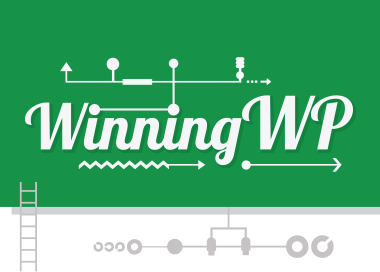
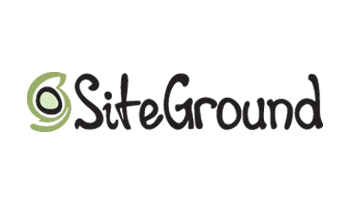

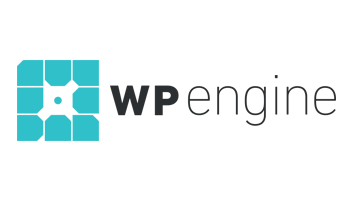
All comments are held for moderation. We'll only publish comments that are on topic and adhere to our Commenting Policy.